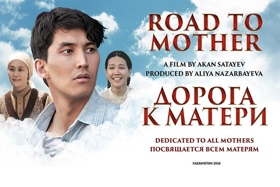
Kazakhstan film, "The Road to Mother" won the highest award for "Best Feature Film" at the WeLink International Film Festival. On March 14th, the United Nations Headquarters in New York City held a forum on "Women in Film," part of the 62 sessions of the Committee on the Status of Women. The forum was lead by the UN deputy director Ramu Damodaran and was attended by approximately 100 filmmakers from all over the world. These included famous Chinese director and chairman of the Union of Cinematographers of China, Li Qiankuan and American documentary film producer Jessica Williamson. Zoe Chang, of UN women association, organized the forum.
In his speech, Damodaran said, "I'm very pleased to see Asian women filmmakers receiving worldwide recognition. We are expecting that more women will be part of film production in the near future." Representatives of the Kazakh delegation also confirmed positive trends in their domestic film market, where more and more women are leading large projects.
Farida Merkhamitkyzy, a female film director from Kazakhstan said, "Kazakhstan women have a history of over 70 years with achievements in producing and film making. Especially in 2016 with the support of female director, Aliya Nazarbayeva, who received awards at multiple film screenings around the world."
The WeLink International Film Festival, held for the second time in the United States with the support of the United Nations, was the key event at the New York Forum. The film festival gathered the creators of various film genres from the USA, China, South Korea, Sudan, Thailand, Taiwan, Japan, Kazakhstan and other countries.
The historical drama "The Road to Mother," by executive producer Aliya Nazarbayeva, producer Svetlana Korotenko and director Akana Sataeva, received high praise from the festival jury and won the highest award in the "Achievement of Life" category. The film was watched by representatives of the Kazakh diaspora, who live and work in New York. They were interviewed about the film afterward and could not hide their emotions and tears. The film has already gained international recognition, winning the highest awards at film festivals in Spain, Russia and Croatia.
The story is set during one of the most tragic periods in the history of the former USSR republic of Kazakhstan. It tells a story of the power of a mother's love which endures challenges of the turbulent times. "As a true Kazakh, I couldn't be indifferent to such emotional image, that truly represents my nation," says Aliya Nazarbayeva.
The storyline covers a timespan from the 1930's to the present day with key elements of collectivization, war and postwar years for the Kazakh people.
Comments
To post a comment, you must
register and
login.


